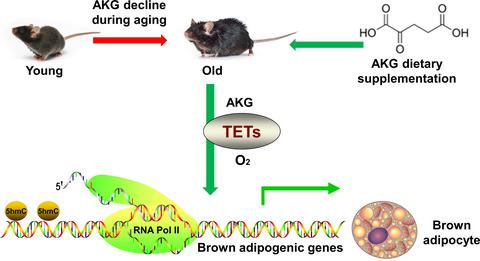当前位置:
X-MOL 学术
›
Aging Cell
›
论文详情
Our official English website, www.x-mol.net, welcomes your
feedback! (Note: you will need to create a separate account there.)
Dietary alpha-ketoglutarate promotes beige adipogenesis and prevents obesity in middle-aged mice.
Aging Cell ( IF 8.0 ) Pub Date : 2019-11-06 , DOI: 10.1111/acel.13059 Qiyu Tian 1 , Junxing Zhao 1, 2 , Qiyuan Yang 1, 3 , Bo Wang 1 , Jeanene M Deavila 1 , Mei-Jun Zhu 4 , Min Du 1
Aging Cell ( IF 8.0 ) Pub Date : 2019-11-06 , DOI: 10.1111/acel.13059 Qiyu Tian 1 , Junxing Zhao 1, 2 , Qiyuan Yang 1, 3 , Bo Wang 1 , Jeanene M Deavila 1 , Mei-Jun Zhu 4 , Min Du 1
Affiliation

|
Aging usually involves the progressive development of certain illnesses, including diabetes and obesity. Due to incapacity to form new white adipocytes, adipose expansion in aged mice primarily depends on adipocyte hypertrophy, which induces metabolic dysfunction. On the other hand, brown adipose tissue burns fatty acids, preventing ectopic lipid accumulation and metabolic diseases. However, the capacity of brown/beige adipogenesis declines inevitably during the aging process. Previously, we reported that DNA demethylation in the Prdm16 promoter is required for beige adipogenesis. DNA methylation is mediated by ten–eleven family proteins (TET) using alpha‐ketoglutarate (AKG) as a cofactor. Here, we demonstrated that the circulatory AKG concentration was reduced in middle‐aged mice (10‐month‐old) compared with young mice (2‐month‐old). Through AKG administration replenishing the AKG pool, aged mice were associated with the lower body weight gain and fat mass, and improved glucose tolerance after challenged with high‐fat diet (HFD). These metabolic changes are accompanied by increased expression of brown adipose genes and proteins in inguinal adipose tissue. Cold‐induced brown/beige adipogenesis was impeded in HFD mice, whereas AKG rescued the impairment of beige adipocyte functionality in middle‐aged mice. Besides, AKG administration up‐regulated Prdm16 expression, which was correlated with an increase of DNA demethylation in the Prdm16 promoter. In summary, AKG supplementation promotes beige adipogenesis and alleviates HFD‐induced obesity in middle‐aged mice, which is associated with enhanced DNA demethylation of the Prdm16 gene.
中文翻译:

日粮α-酮戊二酸酯可促进米色脂肪形成,并预防中年小鼠肥胖。
衰老通常涉及某些疾病的逐步发展,包括糖尿病和肥胖症。由于不能形成新的白色脂肪细胞,衰老小鼠的脂肪膨胀主要取决于脂肪细胞肥大,从而引起代谢功能障碍。另一方面,棕色脂肪组织会燃烧脂肪酸,从而防止异位脂质蓄积和代谢疾病。但是,在衰老过程中,褐色/米色脂肪形成的能力不可避免地下降。先前,我们报道了Prdm16中的DNA去甲基化启动子是米色脂肪形成所必需的。DNA甲基化是由11个家族蛋白(TET)使用α-酮戊二酸(AKG)作为辅因子介导的。在这里,我们证明了与年轻小鼠(2个月大)相比,中年小鼠(10个月大)的循环AKG浓度降低了。通过补充AKG池的AKG管理,高脂饮食(HFD)攻击后,衰老的小鼠体重增加和脂肪含量降低,以及葡萄糖耐量提高。这些代谢变化伴随着腹股沟脂肪组织中棕色脂肪基因和蛋白质表达的增加。在HFD小鼠中冷诱导的褐色/米色脂肪形成受到阻碍,而AKG挽救了中年小鼠中米色脂肪细胞功能的损害。此外,AKG管理部门上调了Prdm16表达,这与Prdm16启动子中DNA脱甲基的增加有关。总之,AKG补充剂可促进米色脂肪形成并减轻HFD诱导的中年小鼠肥胖,这与Prdm16基因的DNA脱甲基作用增强有关。
更新日期:2019-11-06
中文翻译:

日粮α-酮戊二酸酯可促进米色脂肪形成,并预防中年小鼠肥胖。
衰老通常涉及某些疾病的逐步发展,包括糖尿病和肥胖症。由于不能形成新的白色脂肪细胞,衰老小鼠的脂肪膨胀主要取决于脂肪细胞肥大,从而引起代谢功能障碍。另一方面,棕色脂肪组织会燃烧脂肪酸,从而防止异位脂质蓄积和代谢疾病。但是,在衰老过程中,褐色/米色脂肪形成的能力不可避免地下降。先前,我们报道了Prdm16中的DNA去甲基化启动子是米色脂肪形成所必需的。DNA甲基化是由11个家族蛋白(TET)使用α-酮戊二酸(AKG)作为辅因子介导的。在这里,我们证明了与年轻小鼠(2个月大)相比,中年小鼠(10个月大)的循环AKG浓度降低了。通过补充AKG池的AKG管理,高脂饮食(HFD)攻击后,衰老的小鼠体重增加和脂肪含量降低,以及葡萄糖耐量提高。这些代谢变化伴随着腹股沟脂肪组织中棕色脂肪基因和蛋白质表达的增加。在HFD小鼠中冷诱导的褐色/米色脂肪形成受到阻碍,而AKG挽救了中年小鼠中米色脂肪细胞功能的损害。此外,AKG管理部门上调了Prdm16表达,这与Prdm16启动子中DNA脱甲基的增加有关。总之,AKG补充剂可促进米色脂肪形成并减轻HFD诱导的中年小鼠肥胖,这与Prdm16基因的DNA脱甲基作用增强有关。











































 京公网安备 11010802027423号
京公网安备 11010802027423号